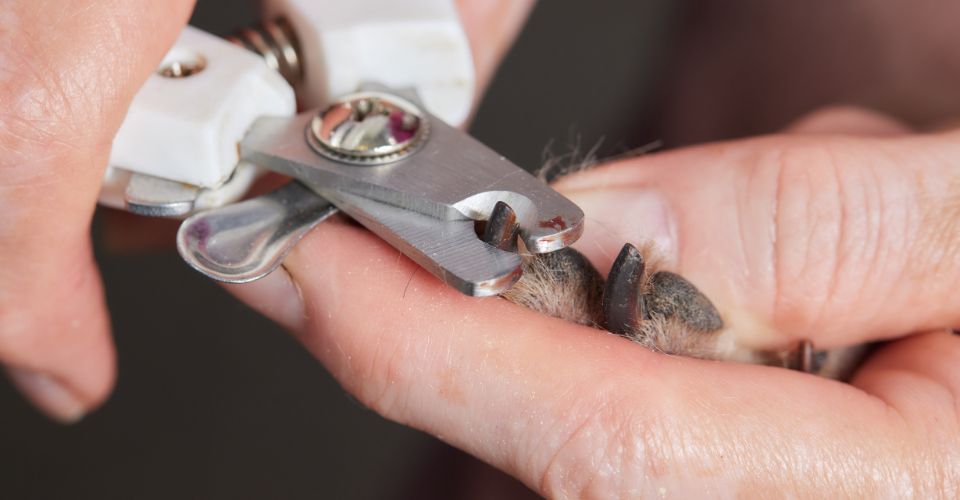Can dogs eat watermelons?
Yes, they can.
Not only are watermelon yummy, but they are also nutritious, refreshing, and mood-changers as well. And as the cherry on top, dogs love to slurp on this red flesh, too.
Dogs have this thing to sniff and taste anything they get their paws on. But, once they’d lick this sugary red treat, there is no going back.
However, make sure that the dog eats only the juicy part and not the rind or seeds. Plus, don’t let watermelons be their regular treat; too much of anything is bad.
1. Why Are Watermelons Good For Dogs?
1 cup of watermelon contains the following nutritional benefits.
a. Nutritional Benefits of Watermelon
i. Vitamin A
Dogs need Vitamin A for proper growth and nourishment of skin, coat, nerves, and muscles. If a dog doesn’t get enough Vitamin A, it can lead to skin dermatitis and night blindness. It is also crucial for pregnant female dogs and puppies.
ii. Vitamin B6 (Pyridoxine)
Vitamin B6 maintains a variety of functions for dogs. One of its primary benefits is to support amino acid metabolism and also helps reinforce proper bladder health in dogs.
iii. Iron
The dietary iron requirement for adult dogs is around 80 mg/kg in dry form, but the requirement is higher in puppies due to their rapid growth. The function of iron in a dog’s body is the same as that in humans: Carrying oxygen in hemoglobin throughout the body to produce energy. It is also essential for the optimized functioning of certain enzymes.
Watermelon contains 35 mg of iron per cup, which makes it good for dogs as well as puppies.
It’s worth mentioning here that lack of iron can lead to anemia in dogs, so keep an eye on the iron intake.
iv. Potassium
Potassium is an important electrolyte that aids in the transmission of electrical charges and impulses in the heart, nerves, and muscles. The deficiency of potassium causes lethargy, fatigue, difficulty in standing up, and loss of appetite in dogs.
The deficiency of potassium causes hypokalemia, skin diseases, and constipation. One cup of watermelon comprises 155mg potassium, making it a healthy snack for dogs.
v. Calcium
According to research by the Association of American Feed Control Officials (AAFCO), an adult dog should consume 1.25 mg calcium/kcal daily. Calcium is important for dogs as it is the key content of bone, teeth, nails, and skeletal mineralization.
vi. Fiber
The function of fiber is to aid in digestion, absorb extra water, manage extra weight, lower the risk of diabetes mellitus, properly actuate the gastrointestinal tract, and maintain pH to inhibit the growth of internal parasites, bacteria, and yeasts in the dog’s gut.
Per the research, a dog should consume 2 to 4% of fiber daily to have a healthy digestive tract and balanced nutrients. A cup of watermelon has 5% of fiber in it, which means it can cater to a dog’s needs.
vii. Protein
Protein is a critical macronutrient for dogs as compared to fats and carbs. They are good for muscles, hair, nails, and internal body functioning. Vets recommend feeding dogs with food that contains more protein.
Depending on the dog’s age, food should contain at least 18 to 29% proteins. Adult dogs require 18 to 25% protein, while a growing puppy needs 29%, as they have more nutritional requirements.
Watermelon comprises 1g of protein, making it a healthy snack for dogs.
viii. Carbohydrate
There is a misconception that dogs can’t digest carbs and rely on proteins and fats for their energy requirements. However, it’s not true, because there are enzymes that are present in a dog’s stomach that can break the starch, releasing energy.
Though complex carbs such as starches and fibers take time to digest, simple carbohydrates such as fructose, sucrose, and lactose, etc., easily get consumed.
Luckily, watermelon contains fructose sugar, so your dog’s stomach won’t get upset after being filled with juicy watermelon.
ix. Fat
0g of fat means watermelon won’t add extra lipid layers to the dog’s body. Excess of fat does not only make dogs obese, but it also causes heart and blood pressure issues.
x. Lycopene
Lycopene is an important antioxidant that gives the watermelon red color. It reduces the chances of cancer in dogs as well as helps them with their vision problems.
Other than these 10 nutrients, watermelon also contains other vitamins and minerals that are healthy for dogs.
b. Benefits of Dogs Eating Watermelon
i. Maintains Immune System Health
Watermelons maintain the immune system of dogs, especially vis-à-vis cancer. Antioxidants present in watermelon combat chronic inflammation and protect the body from the damages of cancer-causing free radicals.
ii. Repairs Damaged Tissue
Watermelon contains a reasonable amount of Vitamin C, a vitamin that helps maintain the density of skin, bones, muscles, and tendons and repair damaged tissues.
iii. Increases Serotonin Level in the Brain, Blood Platelets, and Bowels
Vitamin B6 is responsible for the production of serotonin. This hormone is associated with mood stability, happiness, digestion, and sleeping. Thus if your buddy is getting mood swings, give him the sweetness of watermelon and see the magic.
iv. Converts Food Into Energy
Vitamin B1 (thiamine) present in watermelon helps the stomach break carbohydrates and convert them into energy.
v. Supports Eye Health
A good amount of Vitamin A and lycopene present in watermelons are responsible for producing the pigments in the retina, preventing the age-related macular degeneration and night blindness.
vi. Helps Muscles Function
Watermelon is rich in amino acids called l-citrulline. It not only help dogs with decreasing muscle soreness but also increase the functionality of muscles. This makes watermelon good, especially for dogs that need high-impact workouts daily.
An interesting fact is that cirtulline is used in supplements for athletes to support their muscle functionality.
vii. Regulates Blood Pressure
The citrulline present in watermelon aids in managing high blood pressure by producing nitric oxide, a gas that decreases pressure on blood vessels and promotes flexibility in arteries.
viii. Prevents Heart Disease
A watermelon is enriched with health-beneficial vitamins, minerals, macronutrients, and bioactive elements such as L-citrulline, lycopene, and beta-carotene. All of them help in the prevention of cardiovascular diseases (CVD) in dogs.
2. How To Feed Watermelon to Your Dog?
Watermelon has three parts: Rind, flesh, and seeds.
Though seedless watermelons are in the market thanks to science, if you have watermelon with seeds, make sure to remove seeds and rind. Dog cannot digest any of these; if consumed too much, it can lead to intestinal blocking.
Similarly, if the watermelon is not completely ripe and tastes sour, don’t give it to your dog.
3. How Much Watermelon Is Too Much for Dogs?
One cup of diced raw watermelon contains about 46 calories. As per research, only about 10% of your dog’s daily calories should come from treats. For example, if your dog needs 300 calories per day, 30 calories should come from treats, with the other 270 calories coming from their normal food.
A healthy, 10-pound dog with a moderate activity level will need 350 calories daily. This means one cup of raw watermelon is enough for him.
So, how much watermelon should be fed to a dog depends on his weight, size, age, and activity levels. It is better to consult your vet for the exact amount.
a. Why Can Too Much Watermelon Be Dangerous For Dogs?
Though watermelons are healthy and your dog will gain plenty of benefits after eating it, too much of it can also lead to health problems. Some of them are listed below.
i. Choking Hazard
If your dog chows down all the chunks at the same time, or if they accidentally eat the rind, this can lead to choking, which can be deadly for your dog.
ii. Diabetes
Though a cup of watermelon contains only 5g of sugar, if consumed in large amounts, this can create serious health issues. Especially if your dog is not involved in required physical activity to burn out calories, they are at risk of diabetes from eating too much watermelon.
iii. Obesity
Not only diabetes, obesity is another concern if your dog is gulping down watermelon but not working out. The excess sugars will get stored in the body, making your dog fat.
iv. Hyperkalemia
Too much watermelon means too much potassium.
Hyperkalemia is a condition in which potassium levels in the blood rise, leading to a slow heartbeat. If not treated immediately, the heart can altogether stop.
v. Hypervitaminosis A
Apart from other vitamins, watermelons have an abundant amount of vitamin A. Excessive intake of Vitamin A leads to hyperactivity, irritability, or blood toxicity in dogs.
vi. Diarrhea
Watermelons have 92% of water, which is a good thing. But consuming too much water can lead to swelling in the legs, exhaustion, diarrhoea, and weak kidneys. Lycopene present in watermelon also causes diarrhea, vomiting, nausea, and bloating in dogs.
b. Which Dogs Can’t Eat Watermelon?
Dogs already having hyperkalemia, hypervitaminosis, obesity, and water-retention etc., can’t eat watermelon.
4. Easy Watermelon Treats for Dogs
- Dehydrated Watermelon
- Frozen Watermelon
- Raw Watermelon
- Watermelon Dog Treats
- Dog Watermelon Popsicles
- Watermelon Pupsicles
- Frozen Watermelon Cucumber Dog Treats
- Watermelon Cocktail
- Watermelon Granita
So, can dogs eat watermelons? Yes, but make sure to give dogs the right amount. Dog owners should be more vigilant while feeding puppies and senior dogs watermelons because their immune system is weak and their stomachs are sensitive. Even if food is not toxic, over-consumption of food can give your pup serious health complications.





